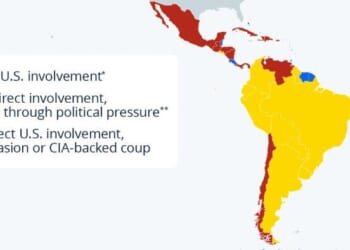A new study is being cited as proof that cellphone bans improve student outcomes. Yet, the researchers may have overlooked a major policy shift in their baseline year—one that likely drove the very gains they attribute to the ban. What they may be observing is not the effect of removing phones, but the effect of schools reintroducing stronger discipline and order in the classroom.
Published by the National Bureau of Economic Research, the study by David Figlio of the University of Rochester and Umut Özek of RAND Corporation examines a “large urban county-level school district (LUSD)—one of the ten largest in the United States,” which is almost certainly Miami-Dade County Public Schools. They compare outcomes before and after Florida’s 2023 cellphone ban took effect, reporting modest test score gains of about one percentile point on standardized exams in the second year of the ban, a temporary spike in suspensions, and minor declines in unexcused absences. They argue these results suggest improved academic focus and discipline following the ban, though the effects were small and inconsistent across student groups.

What the study does not address is that, in September 2022—at the very start of the baseline year—Miami-Dade fundamentally reversed its approach to school discipline.
From 2015 to 2022, the district had effectively replaced traditional out-of-school suspensions with off-site “Student Success Centers,” which were intended to provide counseling and support. Suspensions plummeted from over 20,000 in the 2014-2015 school year to nearly zero the following year, a transformation that district leaders touted as evidence of their commitment to ending the school-to-prison pipeline.
But in September 2022, the same month the study’s baseline period began, Superintendent Jose Dotres suspended the Success Centers program. In a letter to the Florida Department of Education, he wrote that “school-site administrators have been reminded that they have full authority to administer any and all appropriate disciplinary actions to students as outlined in our Code of Student Conduct, inclusive of outdoor suspension.”
Why the sudden reversal? A statewide grand jury had just issued a scathing report accusing Miami-Dade of “laundering” school safety data. Investigators found Miami-Dade had underreported suspensions and serious disciplinary incidents for years and could not produce evidence that the Success Centers reduced misbehavior or improved outcomes. State officials directed the district to restore standard disciplinary reporting and enforcement.
The cellphone ban didn’t take full effect until September 2023, one year after schools began reestablishing traditional discipline practices. When the authors observe that suspension rates doubled once the ban was enforced, what’s being measured could reflect several overlapping dynamics: new infractions related to cellphone use, more accurate reporting of suspensions after years of undercounting, administrative responses to state scrutiny, a general return to stricter discipline, or schools using the cellphone ban as an excuse to suspend students they wanted to suspend anyway.
The study provides no way to disentangle these effects. The study’s design compares schools with high and low pre-ban cellphone use, assuming those differences capture exposure to the ban rather than broader school climate factors. Yet, in practice, schools that tolerated heavier cellphone use before the ban likely had weaker overall discipline policies. When those same schools began enforcing stricter behavioral policies in response to the 2022 directive, their classrooms likely became more orderly. That shift could produce what looks like a “cellphone effect” even if the real driver was a broader return to traditional discipline.
Even taking the findings at face value, the academic gains are modest: about a one-percentile improvement in the second year. The effect applied mainly to male students in middle and high school, and it coincided with suspension rates doubling and a 30 percent increase in in-school suspensions for Black students.
These shifts may reflect better focus and attendance, but they fall far short of what’s needed to close post-pandemic learning gaps. Cellphone bans can help restore order and attention, yet order alone does not drive achievement. Real learning gains come from high-quality curriculum, tutoring, and great instruction.
For years, education leaders over-promised what technology could deliver, treating it as a silver bullet for learning. Now we risk swinging too far in the other direction, believing that removing technology will solve deeper problems or create an excuse to not advance more difficult, but urgently needed reforms.
What’s missing from the debate isn’t whether cellphones distract students—they do—but whether bans meaningfully improve learning. The real question isn’t about phones at all; it’s whether we’re using policy to confront the right problem. Order matters, but it’s only the beginning. The real progress will come from the patient, demanding work of strengthening great instruction, providing targeted support to students, and helping teachers deliver high-quality, evidence-based practices—from tutoring and the science of reading to high-quality instructional materials.
The post Discipline, Not Devices: The Real Driver Behind Florida’s Test Score Gains appeared first on American Enterprise Institute – AEI.












